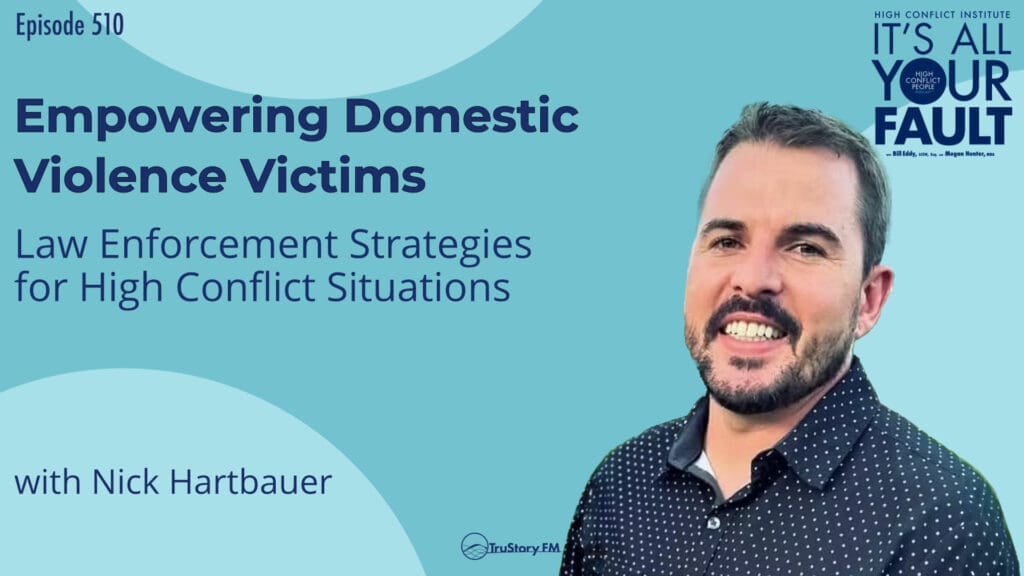Domestic Violence: A Closer Look from the Perspective of Law Enforcement
In this episode of It’s All Your Fault, Bill and Megan are joined by special guest Nick Hartbauer, a law enforcement officer with 16 years of experience, to discuss domestic violence calls and how understanding high conflict personalities can help victims and law enforcement navigate these challenging situations more effectively.
Identifying High Conflict Personalities in Domestic Violence Calls
Nick shares his journey of discovering the concept of high conflict personalities through Bill’s books and how this knowledge has transformed his approach to handling domestic violence calls. He explains how recognizing patterns of unmanaged emotions, all-or-nothing thinking, and blaming others has helped him identify high conflict individuals and better support victims.
Empowering Victims Through Understanding
One of the most significant insights Nick gained from learning about high conflict personalities is the importance of helping victims understand that their abusive partner is unlikely to change. By sharing this knowledge with victims, Nick has empowered many to leave abusive relationships and move forward with their lives.
Navigating Domestic Violence Calls: Strategies and Observations
Nick walks listeners through the process of responding to both low-risk and high-risk domestic violence calls, highlighting the importance of separating the parties involved and listening for signs of high conflict behavior, such as lying, manipulation, and lack of responsibility. He also shares how he assesses the situation to determine who the true victim is in each case.
Questions we answer in this episode:
- How can understanding high conflict personalities help law enforcement handle domestic violence calls more effectively?
- What are some signs that a person involved in a domestic violence call may have a high conflict personality?
- How can law enforcement officers empower victims of domestic violence?
- What strategies do law enforcement officers use to navigate domestic violence calls and determine who the true victim is?
- How common is it for the suspect in a domestic violence call to lie or manipulate the situation?
Key Takeaways:
- Recognizing patterns of high conflict behavior can help law enforcement better support victims of domestic violence.
- Helping victims understand that their abusive partner is unlikely to change can empower them to leave the relationship.
- Separating the parties involved in a domestic violence call is crucial for gathering accurate information.
- Law enforcement officers must listen carefully for signs of lying, manipulation, and lack of responsibility to determine who the true victim is.
- While not all suspects lie, many will attempt to manipulate the situation or blame the victim entirely.
This episode provides invaluable insights into the complexities of domestic violence calls and how understanding high conflict personalities can make a significant difference in the lives of victims. By sharing his expertise and experiences, Nick Hartbauer offers listeners a unique perspective on the challenges law enforcement faces and the strategies they employ to navigate these difficult situations effectively.
About Nick
Nick Hartbauer has been in Law Enforcement for 16 years. He began his career working in a detention center and quickly transitioned to a Patrol position. During his time in law enforcement, Nick served as an Operator on his agency’s Emergency Response Team (aka S.W.A.T) and was trained as a sniper. He also spent five years as a Narcotics Detective, working undercover investigations at both the local and federal levels. During this time, Nick assisted in an FBI investigation involving political corruption where corrupt law enforcement officers were assisting drug cartels.
In addition to his investigative work, Nick served as a training officer on Patrol and during his time as a Narcotics Detective. He was also an instructor for his agency’s undercover school. Nick spent time on the Impact team for his agency, conducting uniformed property crime investigations, and briefly assisted the Property Crimes Detectives.
In recent years, Nick has focused on victims’ crimes while working on patrol, with a particular emphasis on domestic violence investigations. He developed a passion for this area of work as he learned more about the High Conflict Personality Theory from the High Conflict Institute. Nick has incorporated the knowledge gained from the High Conflict Institute into his investigations and training of new officers.
Links & Other Notes
- BOOKS
- COURSES
- ARTICLES
- A Method for Managing Police-Community Relations
- Domestic Violence vs. High Conflict Families: Are one or two people driving the conflict?
- Domestic Violence and Personality Disorders: What’s the Connection?
- How Effective are Restraining Orders with an HCP?
- Living with High-Conflict People: Do’s and Don’ts for Living with an Antisocial High Conflict People
- Differences in Dealing with Borderline, Narcissistic and Antisocial Clients in Family Law
- Understanding Borderline Personality Disorder in Family Law Cases
- OUR WEBSITE
- QUESTIONS
- All of our books can be found in our online store or anywhere books are sold, including as e-books.
- You can also find these show notes at our site as well.
Note: We are not diagnosing anyone in our discussions, merely discussing general patterns of behavior.











